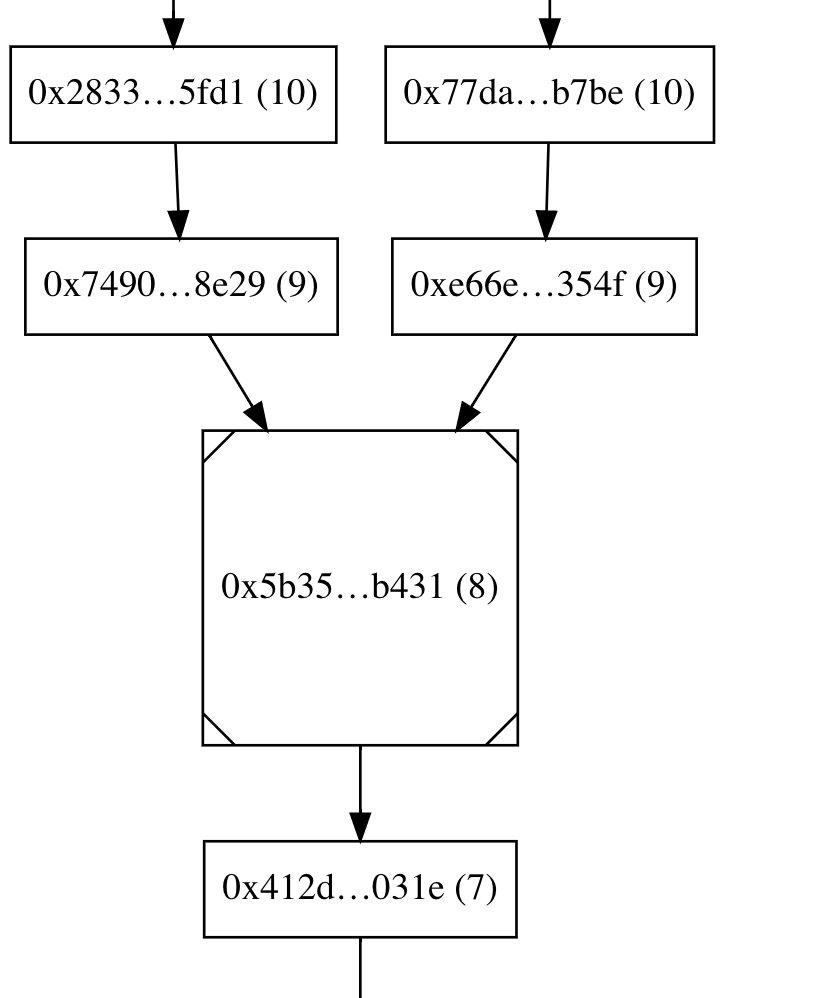mirror of
https://gitlab.com/pulsechaincom/lighthouse-pulse.git
synced 2025-01-15 16:38:20 +00:00
The PR: * Adds the ability to generate a crucial test scenario that isn't possible with `BeaconChainHarness` (i.e. two blocks occupying the same slot; previously forks necessitated skipping slots):  * New testing API: Instead of repeatedly calling add_block(), you generate a sorted `Vec<Slot>` and leave it up to the framework to generate blocks at those slots. * Jumping backwards to an earlier epoch is a hard error, so that tests necessarily generate blocks in a epoch-by-epoch manner. * Configures the test logger so that output is printed on the console in case a test fails. The logger also plays well with `--nocapture`, contrary to the existing testing framework * Rewrites existing fork pruning tests to use the new API * Adds a tests that triggers finalization at a non epoch boundary slot * Renamed `BeaconChainYoke` to `BeaconChainTestingRig` because the former has been too confusing * Fixed multiple tests (e.g. `block_production_different_shuffling_long`, `delete_blocks_and_states`, `shuffling_compatible_simple_fork`) that relied on a weird (and accidental) feature of the old `BeaconChainHarness` that attestations aren't produced for epochs earlier than the current one, thus masking potential bugs in test cases. Co-authored-by: Michael Sproul <michael@sigmaprime.io>
161 lines
4.6 KiB
Rust
161 lines
4.6 KiB
Rust
#![cfg(not(debug_assertions))]
|
|
|
|
#[macro_use]
|
|
extern crate lazy_static;
|
|
|
|
use beacon_chain::{
|
|
test_utils::{AttestationStrategy, BeaconChainHarness, BlockStrategy},
|
|
BeaconChain, BeaconChainTypes,
|
|
};
|
|
use sloggers::{null::NullLoggerBuilder, Build};
|
|
use std::sync::Arc;
|
|
use store::{HotColdDB, LevelDB, StoreConfig};
|
|
use tempfile::{tempdir, TempDir};
|
|
use types::{EthSpec, Keypair, MinimalEthSpec};
|
|
|
|
type E = MinimalEthSpec;
|
|
|
|
// Should ideally be divisible by 3.
|
|
pub const VALIDATOR_COUNT: usize = 24;
|
|
|
|
lazy_static! {
|
|
/// A cached set of keys.
|
|
static ref KEYPAIRS: Vec<Keypair> = types::test_utils::generate_deterministic_keypairs(VALIDATOR_COUNT);
|
|
}
|
|
|
|
fn get_store(db_path: &TempDir) -> Arc<HotColdDB<E, LevelDB<E>, LevelDB<E>>> {
|
|
let spec = E::default_spec();
|
|
let hot_path = db_path.path().join("hot_db");
|
|
let cold_path = db_path.path().join("cold_db");
|
|
let config = StoreConfig::default();
|
|
let log = NullLoggerBuilder.build().expect("logger should build");
|
|
Arc::new(
|
|
HotColdDB::open(&hot_path, &cold_path, config, spec, log)
|
|
.expect("disk store should initialize"),
|
|
)
|
|
}
|
|
|
|
#[test]
|
|
fn finalizes_after_resuming_from_db() {
|
|
let validator_count = 16;
|
|
let num_blocks_produced = MinimalEthSpec::slots_per_epoch() * 8;
|
|
let first_half = num_blocks_produced / 2;
|
|
|
|
let db_path = tempdir().unwrap();
|
|
let store = get_store(&db_path);
|
|
|
|
let mut harness = BeaconChainHarness::new_with_disk_store(
|
|
MinimalEthSpec,
|
|
store.clone(),
|
|
KEYPAIRS[0..validator_count].to_vec(),
|
|
);
|
|
|
|
harness.advance_slot();
|
|
|
|
harness.extend_chain(
|
|
first_half as usize,
|
|
BlockStrategy::OnCanonicalHead,
|
|
AttestationStrategy::AllValidators,
|
|
);
|
|
|
|
assert!(
|
|
harness
|
|
.chain
|
|
.head()
|
|
.expect("should read head")
|
|
.beacon_state
|
|
.finalized_checkpoint
|
|
.epoch
|
|
> 0,
|
|
"the chain should have already finalized"
|
|
);
|
|
|
|
let latest_slot = harness.chain.slot().expect("should have a slot");
|
|
|
|
harness
|
|
.chain
|
|
.persist_head_and_fork_choice()
|
|
.expect("should persist the head and fork choice");
|
|
harness
|
|
.chain
|
|
.persist_op_pool()
|
|
.expect("should persist the op pool");
|
|
harness
|
|
.chain
|
|
.persist_eth1_cache()
|
|
.expect("should persist the eth1 cache");
|
|
|
|
let data_dir = harness.data_dir;
|
|
let original_chain = harness.chain;
|
|
|
|
let mut resumed_harness = BeaconChainHarness::resume_from_disk_store(
|
|
MinimalEthSpec,
|
|
store,
|
|
KEYPAIRS[0..validator_count].to_vec(),
|
|
data_dir,
|
|
);
|
|
|
|
assert_chains_pretty_much_the_same(&original_chain, &resumed_harness.chain);
|
|
|
|
// Set the slot clock of the resumed harness to be in the slot following the previous harness.
|
|
//
|
|
// This allows us to produce the block at the next slot.
|
|
resumed_harness
|
|
.chain
|
|
.slot_clock
|
|
.set_slot(latest_slot.as_u64() + 1);
|
|
|
|
resumed_harness.extend_chain(
|
|
(num_blocks_produced - first_half) as usize,
|
|
BlockStrategy::OnCanonicalHead,
|
|
AttestationStrategy::AllValidators,
|
|
);
|
|
|
|
let state = &resumed_harness
|
|
.chain
|
|
.head()
|
|
.expect("should read head")
|
|
.beacon_state;
|
|
assert_eq!(
|
|
state.slot, num_blocks_produced,
|
|
"head should be at the current slot"
|
|
);
|
|
assert_eq!(
|
|
state.current_epoch(),
|
|
num_blocks_produced / MinimalEthSpec::slots_per_epoch(),
|
|
"head should be at the expected epoch"
|
|
);
|
|
assert_eq!(
|
|
state.current_justified_checkpoint.epoch,
|
|
state.current_epoch() - 1,
|
|
"the head should be justified one behind the current epoch"
|
|
);
|
|
assert_eq!(
|
|
state.finalized_checkpoint.epoch,
|
|
state.current_epoch() - 2,
|
|
"the head should be finalized two behind the current epoch"
|
|
);
|
|
}
|
|
|
|
/// Checks that two chains are the same, for the purpose of this tests.
|
|
///
|
|
/// Several fields that are hard/impossible to check are ignored (e.g., the store).
|
|
fn assert_chains_pretty_much_the_same<T: BeaconChainTypes>(a: &BeaconChain<T>, b: &BeaconChain<T>) {
|
|
assert_eq!(a.spec, b.spec, "spec should be equal");
|
|
assert_eq!(a.op_pool, b.op_pool, "op_pool should be equal");
|
|
assert_eq!(
|
|
a.head().unwrap(),
|
|
b.head().unwrap(),
|
|
"head() should be equal"
|
|
);
|
|
assert_eq!(a.heads(), b.heads(), "heads() should be equal");
|
|
assert_eq!(
|
|
a.genesis_block_root, b.genesis_block_root,
|
|
"genesis_block_root should be equal"
|
|
);
|
|
assert!(
|
|
*a.fork_choice.read() == *b.fork_choice.read(),
|
|
"fork_choice should be equal"
|
|
);
|
|
}
|